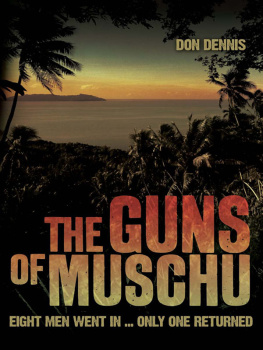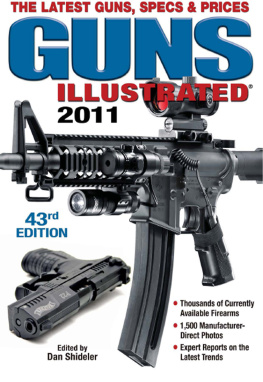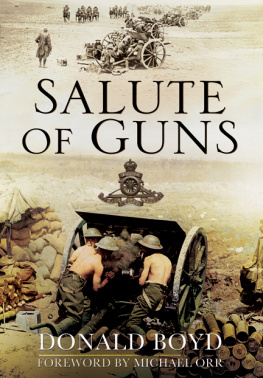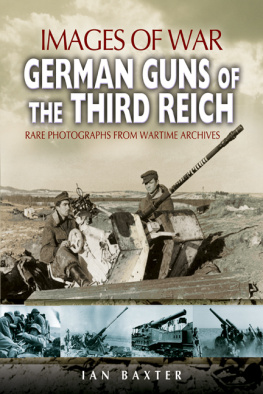Don Dennis - The Guns of Muschu: Eight Men Went In . . . Only One Returned
Here you can read online Don Dennis - The Guns of Muschu: Eight Men Went In . . . Only One Returned full text of the book (entire story) in english for free. Download pdf and epub, get meaning, cover and reviews about this ebook. year: 2006, publisher: Allen & Unwin, genre: History. Description of the work, (preface) as well as reviews are available. Best literature library LitArk.com created for fans of good reading and offers a wide selection of genres:
Romance novel
Science fiction
Adventure
Detective
Science
History
Home and family
Prose
Art
Politics
Computer
Non-fiction
Religion
Business
Children
Humor
Choose a favorite category and find really read worthwhile books. Enjoy immersion in the world of imagination, feel the emotions of the characters or learn something new for yourself, make an fascinating discovery.
- Book:The Guns of Muschu: Eight Men Went In . . . Only One Returned
- Author:
- Publisher:Allen & Unwin
- Genre:
- Year:2006
- Rating:4 / 5
- Favourites:Add to favourites
- Your mark:
- 80
- 1
- 2
- 3
- 4
- 5
The Guns of Muschu: Eight Men Went In . . . Only One Returned: summary, description and annotation
We offer to read an annotation, description, summary or preface (depends on what the author of the book "The Guns of Muschu: Eight Men Went In . . . Only One Returned" wrote himself). If you haven't found the necessary information about the book — write in the comments, we will try to find it.
Don Dennis: author's other books
Who wrote The Guns of Muschu: Eight Men Went In . . . Only One Returned? Find out the surname, the name of the author of the book and a list of all author's works by series.
The Guns of Muschu: Eight Men Went In . . . Only One Returned — read online for free the complete book (whole text) full work
Below is the text of the book, divided by pages. System saving the place of the last page read, allows you to conveniently read the book "The Guns of Muschu: Eight Men Went In . . . Only One Returned" online for free, without having to search again every time where you left off. Put a bookmark, and you can go to the page where you finished reading at any time.
Font size:
Interval:
Bookmark:
THE GUNS
OF MUSCHU
THE GUNS
OF MUSCHU
DON DENNIS

To all those who have served in Australias Special Forces
First published in Australia and New Zealand in 2006
Copyright Don Dennis 2006
All rights reserved. No part of this book may be reproduced or transmitted in any form or by any means, electronic or mechanical, including photocopying, recording or by any information storage and retrieval system, without prior permission in writing from the publisher. The Australian Copyright Act 1968 (the Act) allows a maximum of one chapter or 10 per cent of this book, whichever is the greater, to be photocopied by any educational institution for its educational purposes provided that the educational institution (or body that administers it) has given a remuneration notice to Copyright Agency Limited (CAL) under the Act.
Allen & Unwin
83 Alexander Street
Crows Nest NSW 2065
Australia
Phone: (61 2) 8425 0100
Fax: (61 2) 9906 2218
Email: info@allenandunwin.com
National Library of Australia
Cataloguing-in-Publication entry:
Dennis, D. J. (Donald James), 1945- .
The guns of Muschu.
ISBN 978 1 74114 878 7.
ISBN 1 74114 878 2.
1. Dennis, Mick. 2. World War, 19391945 - Papua New
Guinea - Muschu - Personal narratives, Australian. 3.
World War, 19391945 - Papua New Guinea - Muschu
Participation, Australian. 4. World War, 19391945
Campaigns - Papua New Guinea - Muschu. I. Title.
940.548194
Maps by Don Dennis
Set in 12/18 pt AIProspera Book by Bookhouse, Australia
Printed and bound in Australia by Griffin Press
10 9 8 7 6 5 4 3 2 1
CONTENTS
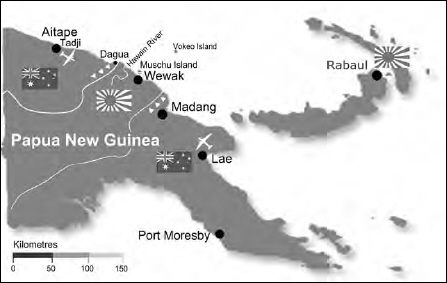
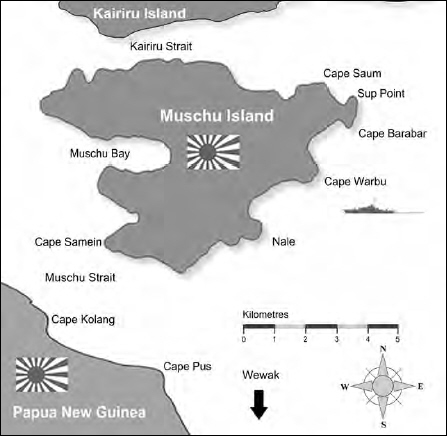
From the cockpit of the Australian Beaufort A9-572, Flight Sergeant Ron Smith stared at the aircrafts starboard wing. A fist-sized hole had suddenly blossomed inboard of the engine and through the jagged metal he could see the jungle streaming past only a hundred feet below.
Smiths first reaction was outrage that the Japanese gunners should damage his aircraft, but this quickly turned to fear as another shell punched through the engine cowl and tore out the fuel lines. Both rounds exploded above the cockpit, ripping shrapnel through the perspex and shattering the instrument panelone fragment slicing the glove across the back of his left hand before lodging in the prismatic compass.
Smith had no time to dwell on his luck: he now had his hands full controlling the aircraft. Even though the starboard engine stopped when the second round ripped through the fuel lines, the propeller continued turning in the slipstream. He tried the propellers feather control but it refused to work. Quickly he opened the throttle on the remaining engine, but the combined effect of dead-engine drag and added power swung the aircraft wildly to the right. To compensate he shoved in the left rudder and aileron, creating more drag that needed even more power. He nudged the boost lever forward until the big Pratt & Whitney radial was delivering its maximum, but even then the aircraft barely maintained altitude.
Smith was no stranger to the Beaufort: in the six months hed been with the squadron hed chalked up almost 400 hours on the aircraft. Before that hed flown Beaufighters for a yearalso in New Guinea. It was a faster and more powerful development of the Beaufort, so in anyones language he was rated as an experienced combat pilot. But now he was faced with a situation that would require all his experience if he and his crew were to survive.
This mornings mission had begun as most had, with a briefing in the 7th Squadron operations room at Tadji, in the Upper Sepik region of Papua New Guinea, before first light. Here, surrounded by aerial photos, maps and weather charts, the Operations Officer outlined reports from coastwatchers, intelligence agents and Army units advancing on the Japanese-held port of Wewak 150 kilometres down the coast. Todays mission was the usual squadron raidnine Beauforts would take off at dawn, gather into formation over the sea, then head for Wewak at 4000 feet. Ten minutes from the target, all aircraft would descend to 500 feet, then cross inland to pick up the run-in marker north of the port and from there, in groups of three, theyd make their attacks.
Australian coastwatchers had reported a Japanese freighter stealing into harbour the previous night, and the raid had been timed so that all aircraft arrived over the port just after sunrise. With luck theyd catch the freighter still unloading, hopefully with plenty of enemy soldiers and vehicles in the open as they tried to disperse the cargo. This was part of the strategy of denying the Japanese essential supplies, and destroying those that did make it through the naval blockade. For this raid all aircraft carried a load of two 250-kilogram and four 120-kilogram bombsthe smaller bombs fused to surface-detonate and cause maximum casualties among the dock workers.
Smith was leading a V formation of three aircraft that had been assigned the dock area. For he and his crew, this mission was just another in what now seemed to be an endless series of raids. However, although theyd made the Wewak run many times, they treated every mission as though it was their first. They knew that complacency was as much a danger as the enemy, and that one momentary slip could turn luck against them.
Wewak was a hive of anti-aircraft fire, and although theyd have an element of surprise, their approach would be reported and every Japanese soldier for miles around would be alerted to their arrival. Over the target they could expect to be met with everything from small arms to 80 mm anti-aircraft fire, much of which was deadly accurate. To minimise their exposure, all aircraft would hug the ground, drop their bombs at low level, then escape out to sea where theyd assess the attack and if necessary select targets of opportunity and hit them again.
That morning the briefing, aircraft pre-flights and take-off went as planned, with no delays or last-minute mechanical problems that often left one or more aircraft behind. The squadron climbed out into the rising sunan irony not lost on Smiththen turned south over the sea and set course for Wewak, 20 minutes away. To the west, the Torricelli Mountains were cloaked in mist that clung to the trees like a white veil; ahead, the sky was clear, with only a few cloud smudges on the horizon to indicate the storms that would build later in the day.
There was the usual after take-off chatter over the intercom as the crew settled into the missionthe navigator in his nose compartment crosschecking with the pilot to ensure their instruments were in sync, the wireless operator in the compartment behind the pilot tuning his equipment and the gunner in the dorsal turret tapping off a few test rounds from his twin .303 calibre machine guns. All were part of a ritual that not only served to confirm that everything was functioning correctly, but also helped calm the crews nerves.
Ten minutes into the flight, an eerie silence descended among the crew. It was always this way when they approached the halfway mark. From here on the situation became deadly serious. Smith shifted in his seat and loosened his seat harness slightly. He had a habit of doing this. Even though the full-body Sutton harness was vital for protection, the straps also restricted movement to such an extent that it could actually hamper a pilots reach. Experience had taught him to compromise.
Next pageFont size:
Interval:
Bookmark:
Similar books «The Guns of Muschu: Eight Men Went In . . . Only One Returned»
Look at similar books to The Guns of Muschu: Eight Men Went In . . . Only One Returned. We have selected literature similar in name and meaning in the hope of providing readers with more options to find new, interesting, not yet read works.
Discussion, reviews of the book The Guns of Muschu: Eight Men Went In . . . Only One Returned and just readers' own opinions. Leave your comments, write what you think about the work, its meaning or the main characters. Specify what exactly you liked and what you didn't like, and why you think so.

